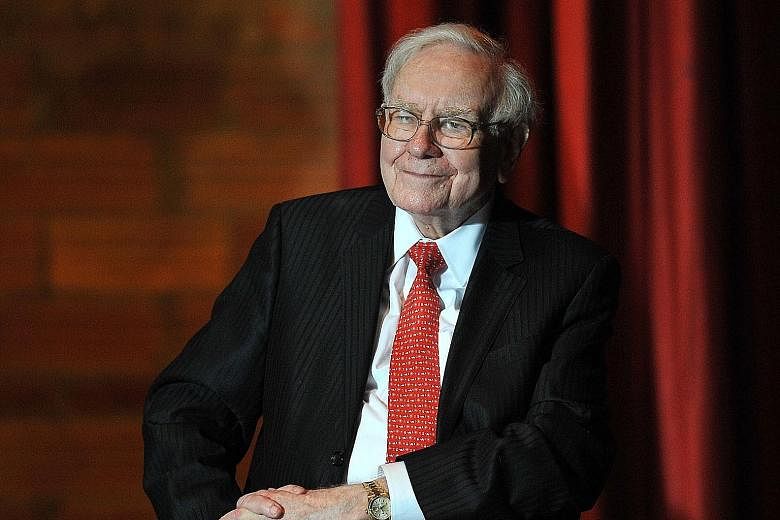Investment guru Warren Buffett's annual letters to shareholders of his holding company, Berkshire Hathaway, always contain useful advice or nuggets of wisdom for investors. Here are some excerpts from the one issued on Feb 27.
It's an election year, and candidates can't stop speaking about our country's problems (which, of course, only they can solve).
As a result of this negative drumbeat, many Americans now believe that their children will not live as well as they themselves do.
That view is dead wrong: The babies being born in America today are the luckiest crop in history.
American gross domestic product (GDP) per capita is now about US$56,000 (S$77,000). As I mentioned last year, that - in real terms - is a staggering six times the amount in 1930, the year I was born, a leap far beyond the wildest dreams of my parents or their contemporaries.
United States citizens are not intrinsically more intelligent today. Nor do they work harder than did Americans in 1930. Rather, they work far more efficiently and thereby produce far more.
This all-powerful trend is certain to continue: America's economic magic remains alive and well.
Some commentators bemoan our current 2 per cent a year growth in real GDP - and, yes, we would all like to see a higher rate. But let's do some simple math using the much-lamented 2 per cent figure.
That rate, we will see, delivers astounding gains.
America's population is growing at about 0.8 per cent a year (0.5 per cent from births minus deaths and 0.3 per cent from net migration). Thus, 2 per cent of overall growth produces about 1.2 per cent of per capita growth.
That might not sound impressive.
But in a single generation of, say, 25 years, that rate of growth would lead to a gain of 34.4 per cent in real GDP per capita.
(The effects of compounding produce the excess over the percentage that would result by simply multiplying 25 x 1.2 per cent.)
In turn, that 34.4 per cent gain would produce a staggering US$19,000 increase in real GDP per capita for the next generation.
If that were distributed equally, the gain would be US$76,000 annually for a family of four.
Today's politicians need not shed tears for tomorrow's children.
Indeed, most of today's children are doing well. All families in my upper middle-class neighbourhood regularly enjoy a living standard better than that achieved by business magnate John D. Rockefeller Sr at the time of my birth.
His unparalleled fortune couldn't buy what we now take for granted, whether the field is - to name just a few - transportation, entertainment, communication or medical services.
Mr Rockefeller certainly had power and fame; he could not, however, live as well as my neighbours now do.
Although the pie to be shared by the next generation will be far larger than today's, how it will be divided will remain in fierce contention.
As is the case now, there will be struggles for the increased output of goods and services between people in their productive years and retirees, between the healthy and the infirm, between the inheritors and the Horatio Algers (those who believe in rags-to-riches tales), between investors and workers and, in particular, between those with talents that are valued highly by the marketplace and the equally decent hard-working Americans who lack the skills that the market prizes.
Clashes of that sort will continue forever. Congress will be the battlefield; money and votes will be the weapons. Lobbying will remain a growth industry.
The good news, however, is that even members of the "losing" sides will almost certainly enjoy - as they should - far more goods and services in the future than they have in the past.
The quality of their increased bounty will also improve dramatically. Nothing rivals the market system in producing what people want - or, even more so, in delivering what people don't yet know they want.
My parents, when young, could not envision a television set. Nor did I, in my 50s, think I needed a personal computer.
Both products, once people saw what they could do, quickly revolutionised their lives. I now spend 10 hours a week playing bridge online. And, as I write this letter, "search" is invaluable to me. (I'm not ready for the Tinder dating app, however.)
For 240 years, it's been a terrible mistake to bet against America, and now is no time to start.
America's golden goose of commerce and innovation will continue to lay more and larger eggs.
America's social security promises will be honoured and perhaps made more generous.
And, yes, America's kids will live far better than their parents did.
Considering this favourable tailwind, Berkshire (and, to be sure, a great many other businesses) will almost certainly prosper.
The managers who succeed Charlie Munger and myself will build Berkshire's per-share intrinsic value by following our simple blueprint of:
•constantly improving the basic earning power of our many subsidiaries;
•further increasing their earnings through bolt-on acquisitions;
•benefiting from the growth of our investees;
•repurchasing Berkshire shares when they are available at a meaningful discount from intrinsic value; and
•making an occasional large acquisition.
Management will also try to maximise results for you by rarely, if ever, issuing Berkshire shares.

